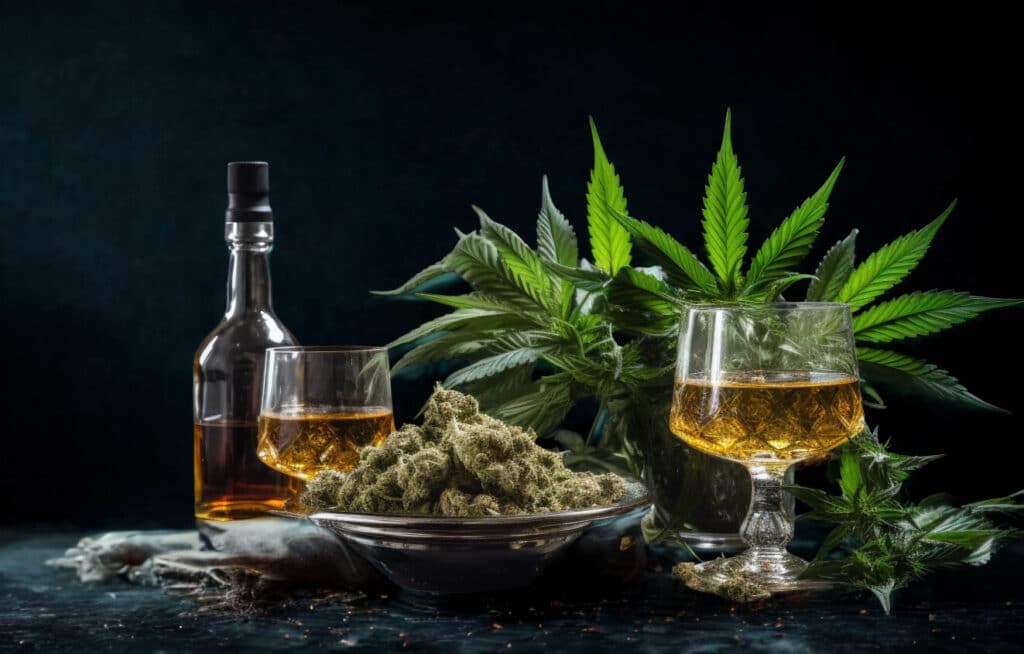“California sober” has gone from niche phrase to mainstream trend—ditch the drinks, keep the weed. But can cannabis actually help people cut back on alcohol, or is it just swapping one habit for another?
A new experiment from Brown University offers some of the clearest evidence yet that getting high can, at least in the short term, reduce how much people drink. It also shows why experts are still reluctant to recommend cannabis as a DIY treatment for problem drinking.
Inside the “Bar Lab”
To mimic real life as closely as possible, researchers built a mock bar in the lab—comfy seating, taps, and each participant’s favorite drink on hand.
In three separate sessions, participants:
- Smoked a high-THC joint
- Smoked a lower-THC joint
- Smoked a placebo joint with only trace THC
After each smoke session, they spent two hours alone in the bar lab with the option to drink up to eight mini-drinks.
What happened?
- After high-THC cannabis, participants drank 27% less alcohol
- After low-THC cannabis, they drank about 19% less
- They also waited longer before their first drink
The findings, published in the American Journal of Psychiatry, suggest a real “substitution effect”—at least in a controlled setting.
A separate Colorado study using a mobile lab found similar results: when people were already high, they drank about 25% less and reported fewer cravings.
Why Researchers Are Still Cautious
Even with these promising numbers, the scientists behind the work are not telling people with alcohol problems to just switch to weed.
A few big caveats:
- Not everyone drank less. In a minority of participants, cannabis actually led to more drinking, underlining how much individual differences matter.
- Who was studied matters. In the Brown trial, most participants already met criteria for cannabis use disorder, and about 40% also met criteria for alcohol use disorder—meaning many were heavy users to begin with, not casual social drinkers.
- Lab behavior isn’t real life. People know they’re being watched and have limited time, so their choices may not perfectly match a normal night out.
So while the data suggest cannabis can blunt alcohol intake for some, it’s far from a guaranteed outcome—and could even backfire for others.
Is Cannabis Really the “Safer” Swap?
Alcohol is still one of the leading causes of preventable death in the U.S., responsible for more than 170,000 deaths a year. Cannabis doesn’t carry the same overdose and liver-damage risks, which is partly why some clinicians see it as a potential harm-reduction tool.
But weed is not risk-free:
- It can impair memory and cognition
- It’s been linked to a severe vomiting syndrome in heavy users
- It can increase the risk of psychosis and other psychiatric issues in vulnerable people
- Daily use can be hard to quit, especially when it becomes a main coping mechanism
Clinicians who’ve helped patients quit drinking with the aid of cannabis also report a familiar pattern: some go on to develop serious cannabis problems instead.
What This Means If You’re “California Sober” Curious
If you’re thinking about using cannabis to cut back on alcohol, the takeaway from the latest research is nuanced, not a green light:
- Weed may help some people drink less—especially in the short term
- It can also do nothing for others, or even push drinking up
- Both substances carry risks, and trading one for the other doesn’t automatically equal “healthy”
Before you experiment, it’s worth talking with a healthcare or addiction professional about:
- Your current drinking pattern and health history
- Any personal or family history of mental health issues
- Safer harm-reduction strategies, including structured treatment
- Non-drug tools for cravings and stress (therapy, support groups, exercise, sleep, etc.)
For now, the science says this: cannabis might sometimes act as a brake on alcohol—but without guidance, it can just as easily become another problem, not a solution.


